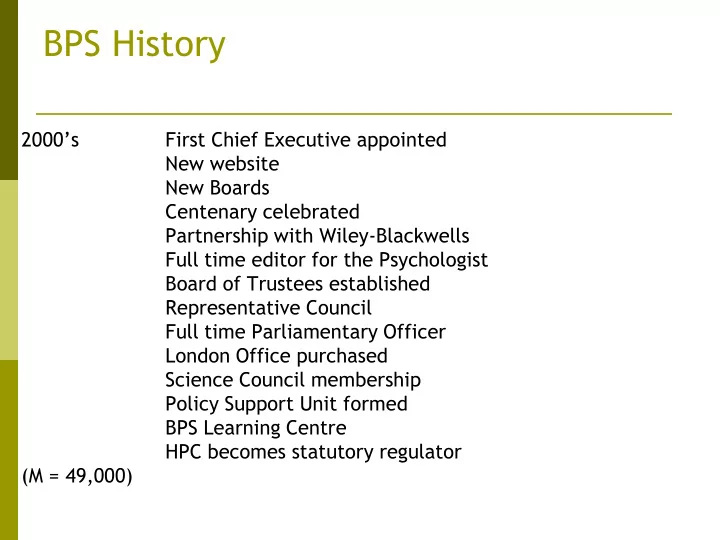

BPS History 2000’s First Chief Executive appointed New website New Boards Centenary celebrated Partnership with Wiley-Blackwells Full time editor for the Psychologist Board of Trustees established Representative Council Full time Parliamentary Officer London Office purchased Science Council membership Policy Support Unit formed BPS Learning Centre HPC becomes statutory regulator (M = 49,000)
BPS Current Position Priority One To be the Learned Society and Professional Body effective and efficient organisation enhance the discipline inclusive membership excellent publication and events working with other disciplines services for members
BPS Current Position Priority Two To make psychology accessible to all improving dissemination inspiring people helping people fulfil their potential listening to those who use our service
BPS Current Position Activities undergrad accreditation in 116 universities 143 postgrad progs in 86 universities provides ethical guidance Member Conduct Rules Chartered membership for 17,000 members grants to support research confers honours and awards 11 scientific journals publishes books with Wiley Blackwell The Psychologist free Research Digest
BPS Current Position Activities website newsletters BPS Online Shop links with psychological societies globally Media Centre Policy Support Unit policy statements responses to government consultations myCPD Learning Centre conferences and other events
BPS Current Position Finance now returned to surplus £10.5 million income £10.1 million expenditure £8.6 million assets costs controlled
The British Psychological Society - income 2009 Investment income 2% Trading income 8% Other income and grants 12% Subscriptions 49% Journals & Book publishing 12% Conferences and events 12% Registers and Directories 5%
The British Psychological Society - expenditure 2009 Investment management fees Trading costs Governance Advancement of 0% 5% 1% 0% Psychology 15% Science and Policy 6% Application of Psychology 18% Membership and Conduct 18% Conferences and events Examinations and 9% training 10% Co-operation with Diffusion of other organisations knowledge 2% 16%
BPS Current Position Subscriptions Resolution voted for in 2007 level set for three years increase based on APR level static for 2008 and 2009 review in 2011
THE SOCIETY - MEMBERS REPRESENTATIVE BOARD OF COUNCIL TRUSTEES RESEARCH PSYCHOLOGY PROFESSIONAL BOARD EDUCATION PRACTICE BOARD BOARD MEMBERSHIP AND PUBLICATIONS AND PROFESSIONAL COMMUNICATIONS TRAINING BOARD BOARD
THE SOCIETY - MANAGEMENT CHIEF EXECUTIVE - Prof Ann Colley CORPORATE SERVICES - Mike Laffan and COMMUNICATIONS MEMBERSHIP SUPPORT - Simon Bowen & SERVICES FINANCE - Russell Hobbs
BPS Current Services for members Annual member survey BPS Learning Centre On line shop Product Teams Members Benefits programme Member Networks Recruitment in The Psychologist Discounts MyCPD
The Society as a Learned Society award schemes to recognise excellence grant schemes to encourage post graduate study visits leading all consultation responses of specific relevance to psychological science oversee the positioning of the Society in response to key developments in science development of guidance documents and policy statements
The Society as a Learned Society representing the Society with regard to psychological science supporting post graduate research students joint working across the Society supporting post doctoral researchers liaison with other organisations liaison with relevant funding agencies recognising emerging and advancing areas of the discipline
The Society as a Learned Society Alternatives to Custodial Sentencing Climate Change Behavioural Economics Debt and Mental Health Knife crime Children in dramatic performances Transparency in Family Courts Expert Witnesses Social Brain Effect on families of immigration detention Positive Education End of Life Care
Foresight Project Mental Capital and Well being: making the most of ourselves in the 21 st century Major challenges ahead: Demographic age-shift Changes in global economy and work Changing nature of society Changing attitudes, values, expectations Changing nature of public services New science and technology
Foresight Project Mental Capital and Well being: making the most of ourselves in the 21 st century Lifespan issues: Children Looked-after children Adolescence Drugs for cognitive enhancement Mental ill-health Promoting positive mental health Adults: learning Adults: working life Older adults
Foresight Project Mental Capital and Well being: making the most of ourselves in the 21 st century Key choices for policy makers : Government Personal and corporate Diversity of stakeholders Longer term benefits Next steps for government : Better use of evidence Better decision making Improved co-ordination
CHANGES Discontinued the voluntary register Establish an online searchable membership list Publish a Directory of Chartered Members from 2010 Change and simplify membership processes Change GBR to GBC Revised the Code of Ethics & Conduct Member Conduct Rules plan for further specialist registers Convert the DoN into a post-qualification register
CHANGES Discontinue functions to be taken on by HPC Review services for members Consult on a new strategic plan Improve information technology and website Establish “The Learning Centre” New education governance structure Use the results of the member survey to review changes Review the Boards
THE FUTURE OF THE SOCIETY MORIBUND STATIONARY FLOURISHING
THE FUTURE OF THE SOCIETY MORIBUND reduced activity few members little money Competitors no volunteers no audience
THE FUTURE OF THE SOCIETY STATIONARY membership static activity static financially challenged some competition difficult to get volunteers routinely consulted but ignored
THE FUTURE OF THE SOCIETY FLOURISHING membership increasing activity increased more sources of income little competition, more partnerships high standard of volunteers consulted and effective
WHY HAVE THE SOCIETY ? We need a flourishing Society to: enhance Psychology pool ideas and energy encourage cross fertilization give us all a more powerful voice represent the discipline help us face challenges together improve us as a learned Society
There is a tide in the affairs of men. Which, taken at the flood, leads onto fortune; Omitted, all the voyage of their life Is bound in shallows and in miseries. On such a full sea are we now afloat, And we must take the current when it serves, Or lose our ventures.
Thank you
Recommend
More recommend